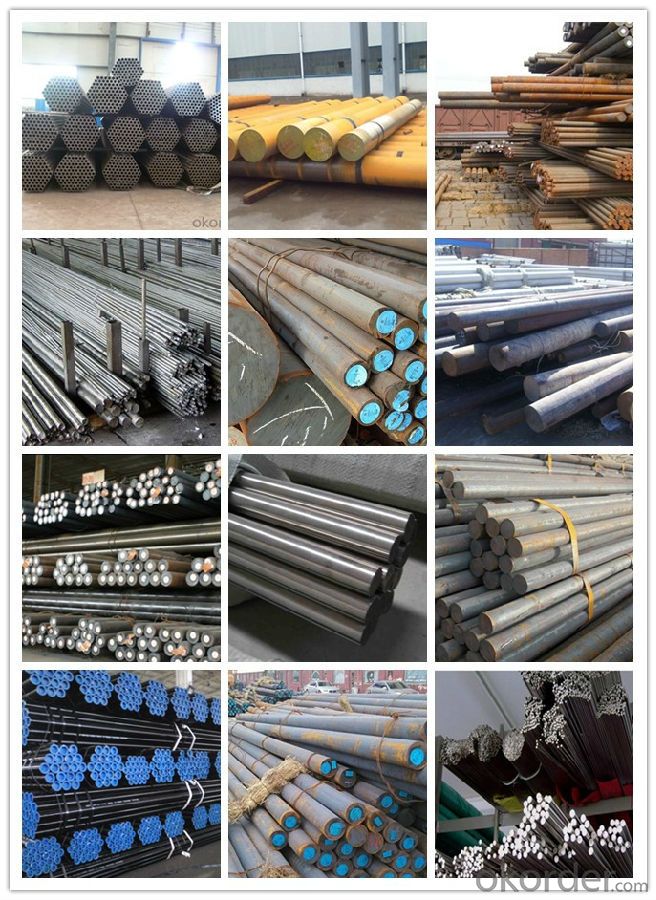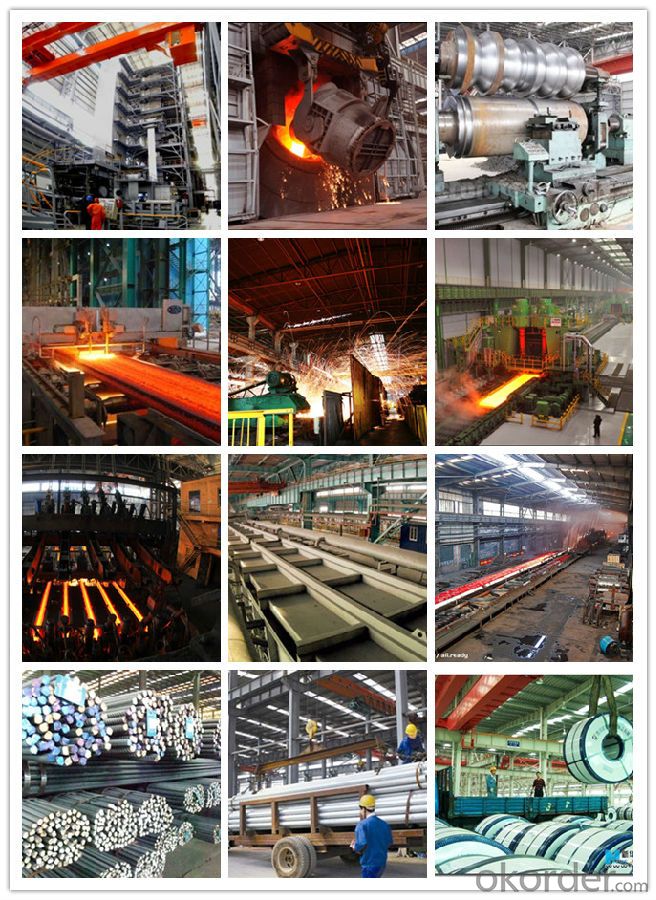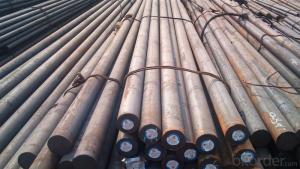Special Steel Cr12MoV, SKD11, D2,D3, 1.2379 Round Bars
- Loading Port:
- China main port
- Payment Terms:
- TT OR LC
- Min Order Qty:
- 30 m.t.
- Supply Capability:
- 10000 m.t./month
OKorder Service Pledge
OKorder Financial Service
You Might Also Like
Item specifice
Specification :
Size | round | Dia 18mm~220mm |
flat | Thickness 6mm-400mm | |
Width 60mm-610mm | ||
Technique | Cold Drawn/Cold Pilfered/Cold Rolled/Hot Rolled/forge- | |
Process | EAF+LF+VD+ Forged/Hot rolled + Heat Treatment (Annealed,A Normalized, Q+T) | |
Heat treatment | Normalized ; Annealed ; Quenched ; tempered | |
Surface Condition | Black surface ; Grinded ; Machined;Turned | |
Inspection | 100% Ultrasonic according to the test standards:SEP1921-84,CLASS C/c or D/d | |
Payment Terms | T/T;L/C | |
Trade Terms | FOB;CIF,CFR | |
Packing | Standard seaworthy packing or as customer required | |
Application | various large-sized mirror plastic mould, precision plastic mould, like: cars accessies, home appliances, electronic equipment plastic mould | |
Product show

Workshop show

Shipping
1. FedEx/DHL/UPS/TNT for samples, Door-to-Door;
2. By Air or by Sea for batch goods, for FCL; Airport/ Port receiving;
3. Customers specifying freight forwarders or negotiable shipping methods!
Delivery Time: 3-7 days for samples; 5-25 days for batch goods.
Payment Terms
1.Payment: T/T, L/C, Western Union, MoneyGram,PayPal; 30% deposits; 70% balance before delivery.
2.MOQ: 1pcs
3.Warranty : 3 years
4.Package Informations: 1) EXPORT, In 20 feet (GW 25 ton) or 40 feet Container (GW 25 ton)
2)as customer's requirement
Why choose us?
(1) The leading exporter in China special steel industry.
(2) Large stocks for various sizes, fast delivery date.
(3) Good business relationship with China famous factories.
(4) More than 7 years steel exporting experience.
(5) Good after-sales service guarantee.
- Q:What are the safety considerations when handling special steel products?
- When handling special steel products, there are a few important safety considerations to keep in mind. Firstly, it is crucial to wear appropriate personal protective equipment (PPE) such as gloves, safety glasses, and steel-toed boots. This will help protect against potential injuries from sharp edges, heavy weight, or flying debris. Secondly, it is important to be aware of the weight and size of the special steel products being handled. Large or heavy items may require mechanical lifting equipment or assistance from others to prevent strain or injury. Additionally, it is necessary to inspect the special steel products for any defects or damage before handling them. This includes checking for cracks, fractures, or any other structural issues that could compromise their integrity. If any defects are found, they should be reported to the appropriate personnel and the products should not be used until they are deemed safe. Furthermore, special steel products may require specific handling techniques or tools. It is important to follow the manufacturer's guidelines and instructions to ensure safe handling. This may include using specialized lifting equipment, clamps, or supports to prevent accidents or damage. Finally, it is essential to have proper training and knowledge on how to handle special steel products safely. This includes understanding the weight limits of lifting equipment, knowing how to properly secure and stabilize the products, and being aware of any potential hazards or risks associated with the specific type of steel being handled. By following these safety considerations, the risk of accidents, injuries, or damage can be minimized when handling special steel products.
- Q:How does special steel perform in mining applications?
- Special steel, also known as alloy steel, is highly advantageous in mining applications due to its unique properties and performance capabilities. First and foremost, special steel exhibits exceptional strength and hardness, making it highly resistant to wear, abrasion, and impact. This durability is crucial in mining operations where heavy machinery, such as crushers, conveyors, and drills, are constantly exposed to harsh and abrasive materials like rocks and ores. Special steel's ability to withstand these extreme conditions minimizes the need for frequent repairs and replacements, thus reducing downtime and increasing productivity. Additionally, special steel possesses excellent corrosion resistance, which is particularly beneficial in mining applications where equipment is exposed to moisture, chemicals, and other corrosive substances. This corrosion resistance ensures the longevity and reliability of mining equipment, reducing maintenance costs and increasing operational efficiency. Moreover, special steel offers good heat resistance and high-temperature stability, enabling it to withstand intense heat generated during mining operations, such as drilling, cutting, and welding. This heat resistance prevents deformation and structural failure of equipment, ensuring the safety of miners and the overall integrity of mining operations. Furthermore, special steel can be tailored and customized to meet specific requirements of mining applications. Its versatility allows for the creation of specialized components and parts that are optimized for specific mining processes, enhancing performance and efficiency. Whether it is high-strength steel for heavy-duty equipment or corrosion-resistant steel for pipelines and storage tanks, special steel can be engineered to fulfill the unique demands of mining operations. In conclusion, special steel's exceptional strength, hardness, corrosion resistance, heat resistance, and versatility make it an ideal material for mining applications. Its ability to withstand extreme conditions, resist wear and corrosion, and deliver superior performance significantly contributes to the efficiency, reliability, and safety of mining operations.
- Q:What are the cost implications of using special steel?
- The cost implications of using special steel can vary depending on several factors. Special steel generally refers to alloyed or high-grade steel that offers enhanced properties such as improved strength, corrosion resistance, or heat resistance. One of the main cost implications is the higher initial cost of special steel compared to regular carbon steel. Special steel often requires more complex and expensive production processes, which can drive up the cost of raw materials. Additionally, the limited availability of certain alloying elements used in special steel can further increase its price. However, using special steel can also lead to cost savings in the long run. Its improved properties can result in reduced maintenance and replacement costs. For example, special steel that offers better corrosion resistance may require less frequent painting or coating, saving on maintenance expenses. Similarly, using high-strength special steel can allow for the use of lighter and thinner components, reducing material costs and transportation expenses. Furthermore, special steel's enhanced performance characteristics can lead to improved product quality and durability, which may result in higher customer satisfaction, increased sales, and potentially higher profits. In summary, while the initial cost of special steel is usually higher, its long-term benefits in terms of improved performance, reduced maintenance, and potential sales growth can offset these expenses, making it a cost-effective choice in many applications.
- Q:How does special steel contribute to the power transmission sector?
- The power transmission sector relies heavily on special steel due to its exceptional properties and performance characteristics. Special steel is highly valued for its strength and resilience, making it an ideal material for manufacturing various components of power transmission systems. For example, transmission towers require special steel for their stability and durability, even in extreme weather conditions. Additionally, special steel's resistance to corrosion is particularly advantageous in the power transmission sector. Power transmission equipment often faces harsh environments, such as high humidity, chemical pollutants, and saltwater exposure, which can speed up corrosion. By using special steel in the manufacturing process, the risk of corrosion-related failures is significantly reduced, ensuring a reliable and uninterrupted power transmission. Furthermore, special steel's excellent electrical conductivity makes it a perfect choice for conductors and cables used in power transmission. Efficient transfer of electrical energy is crucial to minimize power losses and optimize the transmission process. Special steel conductors offer low resistance to the flow of electricity, enabling efficient power transmission over long distances. Moreover, special steel is also employed in the production of transformers and other electrical equipment used in power transmission. The magnetic properties of special steel make it an excellent material for transformer cores, facilitating efficient energy conversion and minimizing energy losses during transmission. In summary, special steel greatly contributes to the power transmission sector by providing strength, corrosion resistance, electrical conductivity, and magnetic properties. These properties ensure the reliability, efficiency, and longevity of power transmission systems, ultimately supporting the uninterrupted supply of electricity to industries, businesses, and households.
- Q:What are the different surface coatings applied to special steel?
- There are several different surface coatings that can be applied to special steel in order to enhance its performance and protect it from various environmental factors. Some of the common surface coatings include: 1. Galvanizing: This is a process in which a layer of zinc is applied to the surface of the steel. It provides excellent corrosion resistance and protects the steel from rusting. 2. Powder coating: This is a technique where a dry powder is electrostatically sprayed onto the steel surface and then cured under heat. It creates a hard, durable, and decorative coating that offers excellent resistance to impact, abrasion, and corrosion. 3. Paint coating: Steel can be coated with various types of paints, including epoxy, acrylic, polyurethane, and enamel. These coatings not only enhance the appearance of the steel but also provide protection against corrosion and weathering. 4. Chrome plating: This process involves electroplating a thin layer of chromium onto the steel surface. It provides excellent resistance to corrosion, wear, and abrasion, making it suitable for applications where the steel is exposed to harsh environments. 5. Ceramic coating: Ceramic coatings are applied through thermal spraying or plasma spraying methods. These coatings offer high-temperature resistance, abrasion resistance, and excellent thermal insulation properties, making them suitable for applications in industries such as aerospace and automotive. 6. Anodizing: This process is commonly used for aluminum, but it can also be applied to certain types of special steel. It involves creating an oxide layer on the surface of the steel through an electrochemical process. Anodizing provides enhanced corrosion resistance and can also be used for decorative purposes. These are just a few examples of the different surface coatings that can be applied to special steel. The choice of coating depends on the specific requirements of the application, including factors such as corrosion resistance, wear resistance, temperature resistance, and aesthetic appearance.
- Q:What are the applications of high-strength low-alloy (HSLA) steel?
- High-strength low-alloy (HSLA) steel has various applications in different industries. It is commonly used in the automotive industry for manufacturing lightweight and fuel-efficient vehicles. HSLA steel is also utilized in construction for building structures that require high strength and durability. Additionally, it finds applications in the manufacturing of heavy machinery and equipment, as well as in the production of pipelines and offshore platforms in the oil and gas industry.
- Q:What are the specific requirements for special steel used in the nuclear industry?
- To ensure the safety, durability, and reliability of special steel used in the nuclear industry, it must meet certain requirements. These requirements encompass the following: 1. Radiation Resistance: Special steel must exhibit high resistance to radiation in order to endure the intense levels present in nuclear reactors. This entails low neutron absorption and minimal degradation when subjected to irradiation. 2. Strength and Toughness: Given the extreme conditions in which nuclear reactors operate, special steel must possess exceptional strength and toughness to prevent structural failure under high temperatures and pressure. 3. Corrosion Resistance: Steel employed in nuclear applications must have a high resistance to corrosion, as exposure to corrosive environments can compromise the integrity of reactor components. This necessitates low susceptibility to stress corrosion cracking, intergranular corrosion, and pitting corrosion. 4. Impurity Content: Special steel must have a low impurity content to mitigate the risk of radioactive contamination. Impurities within the steel can activate and release radioactive particles, posing a significant safety hazard. 5. Thermal Stability: The steel must maintain its mechanical properties even under elevated temperatures, displaying excellent thermal stability. This ensures reliability and expected performance during prolonged exposure to high heat. 6. Non-Magnetic Properties: Certain nuclear reactor components require non-magnetic materials to prevent interference with sensitive instruments and equipment. Special steel used in these applications must possess non-magnetic properties to meet this requirement. 7. Regulatory Compliance: Special steel used in the nuclear industry must adhere to specific regulatory standards and certifications to confirm its suitability for use in nuclear facilities. These standards may vary by country or region, but generally involve rigorous quality control, testing, and inspection procedures. Compliance with these particular requirements is vital for maintaining the safety and integrity of nuclear reactors. By meeting these standards, special steel can withstand the harsh conditions and potential hazards associated with nuclear power generation.
- Q:How does special steel contribute to the pharmaceutical aftermarket industry?
- The pharmaceutical aftermarket industry greatly relies on special steel, which offers numerous benefits that enhance the efficiency and quality of pharmaceutical products. Firstly, special steel's resistance to corrosion and wear makes it ideal for manufacturing pharmaceutical equipment like tanks, vessels, and pipelines. This resistance guarantees the equipment's integrity and prevents any contamination of pharmaceutical products. Furthermore, special steel possesses outstanding heat resistance, enabling it to withstand high temperatures without deformation or degradation. This is especially crucial in pharmaceutical manufacturing processes involving heat, such as sterilization or drying. Special steel's heat resistance ensures the equipment remains stable and reliable, ensuring the safety and effectiveness of pharmaceutical products. Moreover, special steel is renowned for its strength and durability, making it capable of enduring rigorous usage in the pharmaceutical industry. This is vital in the aftermarket industry, where pharmaceutical equipment often undergoes frequent repairs or modifications. The strength and durability of special steel facilitate easy maintenance and repair, reducing downtime and costs for pharmaceutical companies. Additionally, special steel offers excellent hygiene properties, as it can be easily cleaned and sanitized. This is of utmost importance in the pharmaceutical industry, where stringent hygiene standards are crucial to prevent contamination or cross-contamination of pharmaceutical products. Special steel's ease of cleaning and sanitization ensures the equipment remains free from potential sources of contamination, thereby preserving the integrity and quality of the products. In summary, special steel significantly contributes to the pharmaceutical aftermarket industry by providing corrosion resistance, heat resistance, strength, durability, and excellent hygiene properties. These characteristics ensure the integrity, safety, and effectiveness of pharmaceutical products, while also minimizing maintenance costs and downtime for pharmaceutical companies. Thus, special steel plays a pivotal role in the overall efficiency and success of the pharmaceutical aftermarket industry.
- Q:Can special steel be used in automotive engine components?
- Yes, special steel can be used in automotive engine components. Special steel, such as high-strength, heat-resistant, or corrosion-resistant alloys, is often selected for critical engine parts like crankshafts, connecting rods, valves, and camshafts to enhance performance, durability, and efficiency.
- Q:How does special steel perform in high-temperature oxidation resistance?
- Special steel is specifically engineered to possess exceptional resistance to oxidation at high temperatures. This kind of steel incorporates alloying components like chromium, aluminum, and silicon, which generate a protective layer of oxide on the surface when subjected to extreme heat. This oxide layer acts as a barrier, preventing further oxidation and corrosion of the steel. The capacity of special steel to withstand high-temperature oxidation is of utmost importance in scenarios where the material is exposed to intense heat and oxidation, for instance, in gas turbines, heat exchangers, and furnaces. The protective oxide layer aids in preserving the strength and integrity of the steel, even under rigorous conditions. Moreover, special steel also showcases remarkable resistance to creep at high temperatures. Creep refers to the gradual distortion of a material under a consistent load and elevated temperatures. The distinctive composition of special steel grants it the ability to resist creep deformation, thereby enhancing its overall performance and dependability in environments with high temperatures. In conclusion, special steel exhibits exceptional performance in terms of resistance to high-temperature oxidation due to its alloying elements and the formation of a protective oxide layer. Its capability to resist oxidation and maintain its structural integrity at elevated temperatures makes it the preferred choice for numerous industrial applications.
1. Manufacturer Overview |
|
|---|---|
| Location | |
| Year Established | |
| Annual Output Value | |
| Main Markets | |
| Company Certifications | |
2. Manufacturer Certificates |
|
|---|---|
| a) Certification Name | |
| Range | |
| Reference | |
| Validity Period | |
3. Manufacturer Capability |
|
|---|---|
| a)Trade Capacity | |
| Nearest Port | |
| Export Percentage | |
| No.of Employees in Trade Department | |
| Language Spoken: | |
| b)Factory Information | |
| Factory Size: | |
| No. of Production Lines | |
| Contract Manufacturing | |
| Product Price Range | |
Send your message to us
Special Steel Cr12MoV, SKD11, D2,D3, 1.2379 Round Bars
- Loading Port:
- China main port
- Payment Terms:
- TT OR LC
- Min Order Qty:
- 30 m.t.
- Supply Capability:
- 10000 m.t./month
OKorder Service Pledge
OKorder Financial Service
Similar products
New products
Hot products
Related keywords






























